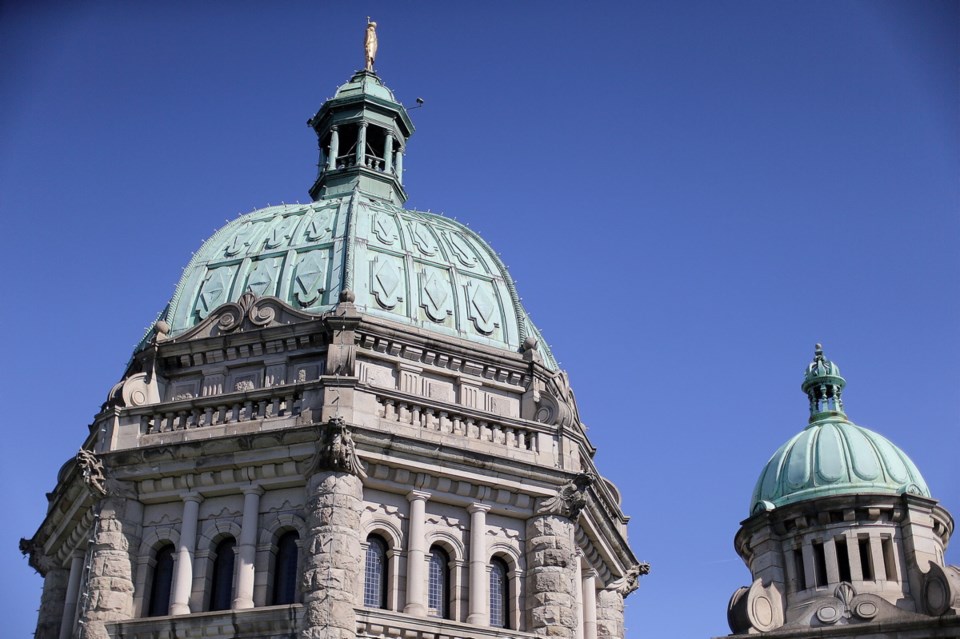Once you get past the misleading subterfuge, the NDP’s re-engineering of political financing in B.C. is actually a perverse kind of masterpiece.
It’s been a four-year master class in how to execute a classic series of head fakes. They led the voters in one popular direction — “get big money out of politics” — and denied there would be any possible downside. Then they introduced the downside — they replaced big private money with taxpayers’ money — but stressed it would only be temporary.
After test-driving that for a few years and getting minimal blowback, now they have a committee studying how to drop that façade and make it all permanent. The whole exercise is just in the final phases now and looks likely to be a complete success.
The end result by next year will probably be an on-going taxpayer subsidy for qualifying political parties, something Premier John Horgan either denied or minimized for years.
It won’t gradually decline, as first indicated. It will actually be indexed to inflation and increase. It won’t be temporary, as promised in the original law, it will be permanent.
And it will include a separate and expensive subsidy of election campaign expenses, as opposed to regular donations. Half the parties’ and candidates’ election expenses are now covered by taxpayers, under a section that came out of nowhere and amounts to millions of dollars in every election cycle.
Horgan’s original idea was in the title of a private bill he introduced before he became premier: “Get Big Money Out of Politics Act.”
But the final version introduced after he took power does no such thing.
It just replaced big private money with big taxpayer money, after Horgan repeatedly denied that’s what was going to happen.
The original version vaguely referred to further study of financing by an independent entity.
The version they introduced once in power scrubbed that and slammed in taxpayer financing, with a time limit to placate any concerns. Then a committee would deliberate on making it permanent.
The finishing touches on this bait-and-switch were underway last week as the legislature committee held hearings on whether to continue the subsidy.
Several witnesses appeared and most of them favoured making it permanent.
(There’s a bit of sensitivity about it. One NDP MLA adjusted her language: “I’m not going to say ‘subsidy.’ I’m going to say ‘allowance.’ ”)
As a measure of which way the wind is blowing, A B.C. Libertarian who emphatically denounced the whole concept was warmly thanked by an NDP MLA for being so far removed from the prevailing thinking.
“This is the most divergent view that we’ve heard. So I really appreciate that we’re getting a good spectrum of different opinions.”
A few academics showed up to validate the idea.
Said one: “There is no reason for them (the subsidies … oops, allowances) to be declining over time. They could be stable and actually rise with the cost of living. If you’re putting up campaign signs … just the lumber, as you well know, is going to cost a lot more.”
More pertinently, the president of the B.C. NDP had some thoughts. Two officials from the party that gets the biggest benefit told an NDP-dominated committee to press on and make it permanent. Guaranteed taxpayer financing avoids the “dramatic uncertainty” about engaging voters during unstable economic times, said one. It should be set at $2 a vote and be indexed to inflation.
The single biggest entity supporting the NDP also endorsed it. The B.C. Federation of Labour urged it be set at $2.50 a vote.
So the political scientists, the party’s major backer and the party officials are all telling the MLAs to write the obvious ending to this piece.
Are the four New Democrats in control of the committee going to ignore all that, fall under the spell of the Libertarians and the Canadian Taxpayers Federation and turn off the taps?
Fat chance.
Nobody mourns that greasy big-money era. Barring union, corporate and large donations was welcomed.
But if Horgan had acknowledged from the start that the taxpayers were the only possible alternative to make up the difference, the switch to permanent government financing would not look as surreptitious and conniving as it does now.
lleyne@timescolonist.com



